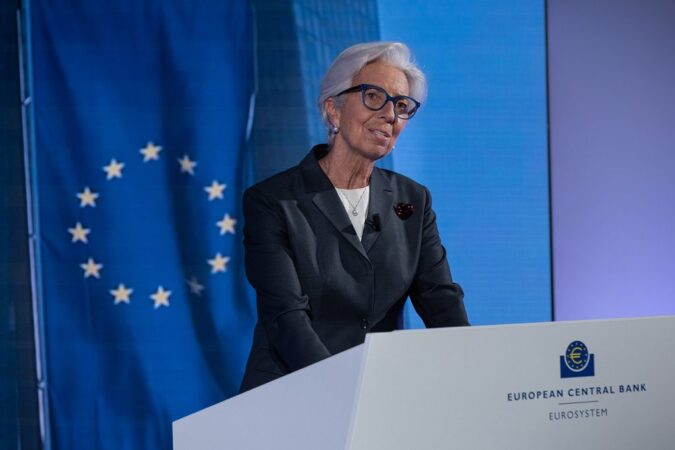Although lockdowns are beginning to ease across Europe after a brutal second wave of coronavirus infections in October and November, governments need to prepare for a second economic hit, European Central Bank (ECB) President Christine Lagarde said on December 1.
“Clearly all the [Purchasing Managers’ Index] PMI numbers and the latest developments that we are seeing are showing that the economy is still suffering,” Lagarde explained. While positive news about vaccine development means “we are seeing the other side of the crisis,” she argued, “we have not crossed that crisis yet. We are still in the midst of it.”
Since businesses were forced to temporarily close and travel was halted to control the increase in infections of the last two months, policymakers need to ensure that “fiscal policy is going to be more potent and has to continue to be deployed in order to stimulate demand,” Lagarde said. The ECB is prepared to take needed action as well, she added. “We demonstrated that we were there to support the economy during the first wave of coronavirus. We will be there for the second wave which is underway.”
The ECB president spoke with Atlantic Council President and CEO Frederick Kempe to mark the launch of the Atlantic Council’s new GeoEconomics Center. Here’s a brief look at what she had to say on coronavirus stimulus, digital currency, and more:
Riding out the second wave
- Light at the end of the tunnel, but we’re still in the tunnel: Lagarde celebrated the recent news from vaccine developers suggesting that vaccination could be widespread at some point in 2021. But policymakers still have work to do to make sure their economies and societies can ride out the rest of the pandemic storm. “Fiscal authorities have to continue to deploy fiscal tools…because we want to carry [them] to the other side” to ensure that a recovery is possible once vaccines are distributed, she said.
- Focus on fiscal stimulus: With economic data already showing the pain inflicted from the second round of shutdowns across Europe, Lagarde argued that governments must continue to pump fiscal stimulus into the economy. She suggested, however, that policymakers take care to target these measures “because not all sectors are at risk at the moment,” as the manufacturing sector may not need the same rescue package as the beleaguered tourism industry.
- ECB stands ready: While not providing specifics of how the European Central Bank will respond ahead of an important December 10 rate meeting, Lagarde said that the ECB “will recalibrate some of the instruments that we have used in order to make sure that they continue to sustain the economic recovery [and that] they continue to support very attractive financing conditions going forward.”
Watch the full event:
Lessons from crises present and past
- Move quickly: Lagarde explained that policymakers learned from the European sovereign debt crisis of the last decade to respond quickly to shocks as a “crisis is not going to wait for you to make up your mind.” Many in Europe believe, she added, that “if we had moved a little bit faster than we did, it would not have been as costly as it was and it would not have left as many scars as it did.” When the coronavirus crisis hit, this meant that European leaders “understood that we had to act swiftly and together.” This cooperation “leveraged our respective positions and amplified the impact that we had in trying to really put a floor under the economy,” she explained.
- Monetary and fiscal policy “hand in hand”: There was not only cooperation between countries during the pandemic, but coordination between the two main levers of economic power: fiscal policy and monetary policy. “In many countries, monetary policy and fiscal policy went hand in hand,” she explained, as emergency funding to banks by the central bank was effectively paired with government guarantees to allow banks to make riskier loans. “The combination of these two…was a successful instrument,” she explained. Government stimulus efforts were also crucial to helping societies weather the storm in ways the ECB could not achieve. “To make sure that companies were continuing to operate and had access to credit was one thing,” she said, “but having at the same time the fiscal authorities…put in place furlough schemes, unemployment schemes, that will actually support income” was especially important.
- Two key ECB tools: The two cornerstones of the ECB response to the pandemic, Lagarde explained, were an asset-purchasing program and attractive financing terms for banks. The asset-purchase program has grown to $1.3 trillion Euros, she said, which allowed the ECB to “stabilize financial markets” while also preventing a dangerous increase in inflation. The financing terms helped prevent “a seizure of the economy” as banks were able to keep money moving. Lagarde stressed that these terms were “not a gift,” but came with strict conditions that banks actually use the money to extend loans to other businesses or risk losing the special rates.
- A permanent Eurobond?: A key element of the European Union’s rescue plan was the issuance of a joint bond between the twenty-seven EU member states for 750 billion Euros. The “Eurobond” sparked predictions that European authorities would look to create permanent “safe asset” bonds in the style of US treasuries. But Lagarde cautioned that while the Eurobond was “an example of solidarity amongst members of the European Union” in the crisis, she did not think that “the founding mothers and fathers of this new instrument intended for it to stay forever.” The new bond does, however, provide “good standards for whatever further work may be done around similar types of instruments for similar circumstances going forward,” she added.
A digital Euro?
- Demand rising for a new Euro: The pandemic may also trigger another new development for the European Central Bank: the prospect of a digital Euro. The coronavirus has triggered an increased demand for “instant payment, contactless payment, and significant use of digital payment of all sorts,” Lagarde said, which has spurred more interest in a digital bank note issued from the ECB. Lagarde admitted that such a digital Euro “can be faster, cheaper, and more secure than other means of payment,” while also providing “good control of monetary policy.”
- Not so fast though: But despite the likely benefits, it will be some time before a digital Euro is available, Lagarde cautioned. Policymakers must explore potential risks with the digital payment, she said, including the crowding out of banks and private-sector payments, privacy concerns, and risks of money laundering and terrorism financing. “The job has begun, it is clearly in demand, but equally I don’t think that we should move too fast for the sake of being first out of the gate,” she said. It will likely “take a few years before we are safe with it and we can launch,” she predicted.
- China ahead of the game: While Europe is still exploring the idea, China has raced ahead with its plans for a digital currency, as Beijing has already launched large-scale trial runs of their Digital Currency/Electronic Payment (DCEP). While Lagarde acknowledged that China is “ahead of the game,” the country’s digital currency is “still in an experimental stage,” she added that it would be wrong to say that the Chinese have already won the race.
Putting the “Geo” in “Geoeconomics”
- Bringing the world together: Lagarde congratulated the Atlantic Council on the launch of its GeoEconomics Center, which she argued is well-timed for the current coronavirus crisis. “If we are learning anything from the kind of crisis we are going through at the moment, it is that things are handled and have to be addressed on a ‘geo’ basis, meaning the entire globe is concerned.” Atlantic Council Chairman John F.W. Rogers explained that one of the primary focuses of the new Center will be on “ensuring that America works with its time-honored friends and allies to strengthen the global economy, applying a constructive, multi-dimensional approach to the obstacles we collectively face.”
-----
David A. Wemer is associate director, editorial at the Atlantic Council. Follow him on Twitter @DavidAWemer.
The original article can be found @AtlanticCouncil






Leave a Reply